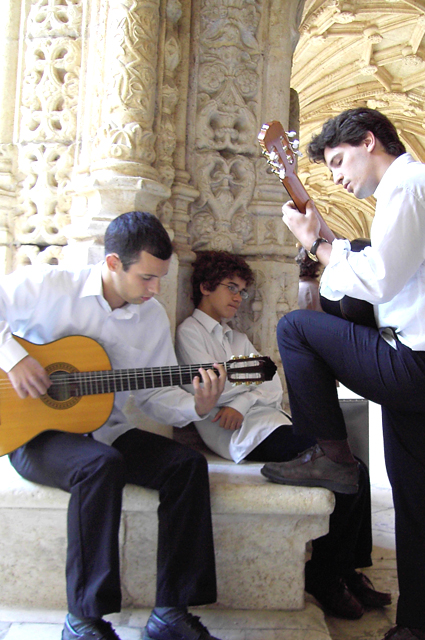
WoT's Hot
"Tudo isso e fado," simply means "All this is Fado." In the previous month’s issue, in the story about Coimbra, Portugal, you must have come across mentions of the Fado, and the immortal ‘Queen of Fado’ – Amalia Rodrigues. Like many of you would be asking, I too once asked “What is Fado?” The answer(s) were extremely intriguing and sometimes, rather complicated. Let us try and unravel at least a tiny bit of the wonderful World-of-the-Fado. The lyrics of the song "Tudo isso e fado" give some indications. Here goes: "You asked me once….if I knew what fado is, I told you I didn’t know, you got surprised….without knowing what to say, I lied at the moment. I told you I didn’t know. But now I am going to tell you….(Fado is) Defeated souls, Lost nights, Bizzare shadows, At Mouraria (a locality in Lisbon where the Moors were confined by Alfonso I of Portugal after the Christian re-conquest in the 12th century ),…. the guitars cry. Love, jealousy, ashes and flame, pain and sin, all this exists, All this is sorrowful, All this is fado….If you wish to be my many, And always have me by your side, Speak to me not only of love, Speak to me of fado as well, And fado is my punishment, It was born solely to make me lost, Fado is everything I say, Fado is everything I say, Plus what I don’t know how to say."
The word “fado” comes from the Latin “fatum,” – the English “fate” has the same origin – and means “destiny, what cannot be changed.” It is the same as the Arabic “maktoub.” What cannot be changed is the fact that the fado has gone on to become a globally recognized as a national symbol of Portugal, even though it is not the national music of the country. That is the ‘destiny’ of the fado.
 Fado is originally associated with the lower levels of people like the working classes, sailors, sex workers, rowdies, and was linked with poverty, roguery and crime. However, it did get the patronage of the upper classes in due course of time.
Fado is originally associated with the lower levels of people like the working classes, sailors, sex workers, rowdies, and was linked with poverty, roguery and crime. However, it did get the patronage of the upper classes in due course of time.
One of the earliest stars of fado was the Lisbon sex worker, Maria Severa (1820- 1846) who sang fado and played the guitar. Her story has acquired such mythical proportions that it is difficult to differentiate fact from faction. Her love affair with the Count of Vimioso, a nobleman who appreciated fado, is widely accepted as the first of many contacts between the nobility and fado-singing working class. Her story is still remembered and sung in many fado songs and lyrics. Since Severa died at an early age of 26, the pathos of her story is of iconographic importance in the universe of fado.
Where did the fado come from? This question too has many answers an – none of them totally convincing for various reasons. I will give you some popular theories and you are welcome to take your pick.
Some say that fado comes from the rich tradition of 12th (?) century troubadours whose songs featured love, chivalry and satirical lyrics. These themes are still there in the present-day fado. Then there is the theory that fado is from the songs of the Moors who settled in Portugal. Some say that it came from Africa. Some say it was brought from Brazil, and is rooted in Lundum, the music of the slaves. I will leave the matter of the origins of the fado to the historians and you.
Fado songs have diverse themes. They have subjects like feelings, love – mostly unrequited or lost, nostalgia for what was or what had to be left behind, friendship, sea voyages, everyday life, joy, sorrow and ‘saudade’ or ‘a nostalgic feeling of the past in the hope that it can be relived’. All this sounds rather mystical? But then they say that “Fado cannot be seen or heard, it simply happens.”
Fado basically ‘happens’ in two forms. The fado as sung by men and women in Lisbon and Porto, and by men (students) only in Coimbra. If the 20th century saw fado universally become a popular symbol of Portugal, it was largely due to the ‘Queen’ – Amalia Rodrigues. Born in 1920 in a poor locality of Lisbon, Amalia used to sell fruit around the docks in Lisbon. She started singing at her fruit stall. From these humble beginnings she zoomed to great heights during a career which spanned six decades. She is accepted not only as the greatest singer in Portugal but one of the greatest in the world of the 20th century. She not only had an astounding voice – perfect for fado-singing – and bewitching beauty and presence.
In ‘Fado Portuguese’ Amalia sang: “Fado was born on a day, When the wind barely stirred, And the seas elongated the skies….On the main rail of a sailing ship, In the chest of the seaman, While sorrowfully he sang….Oh what immense beauty, My land, my hill, my valley, Of golden leaves, flowers and fruits, Do you see lands of Spain, Sands of Portugal….In the mouth of the seaman….The hurtful song fading, With the piercing of desires, From the lips burning with kisses, That kiss the air and nothing more….While sorrowfully he sang….”
Having achieved the status of a national symbol of Portugal, it is no wonder that the fado has been deservedly been declared a UNESCO World Heritage.
I am in a small whitewashed room in the poorer section of Lisbon. The dozen odd tables are all occupied with men and women of all ages. All are busy chomping on sausages and sipping local wine. There is an air of expectation. Suddenly the lights dim and a spotlight is fixed on a middle-aged regal-looking woman with a black shawl. There is a sole musician with a Portuguese guitar. The guitar tinkles and the lady sings a soulful melody. I cannot understand the words, but the sense of yearning and longing for a love is unmistakable. The subtle rhythmic inflections vary from verse to verse, the tune moulds itself to words. There follows an hour of ecstatic joy-sorrow. The silence of the audience is interspersed with appreciative clapping. The lights come on. There is loud clapping. It has been a unique emotional experience.
This is Fado!
Save Save"Tudo isso e fado," simply means "All this is Fado." In the previous month’s issue, in the story about Coimbra, Portugal, you must have come across mentions of the Fado, and the immortal ‘Queen of Fado’ – Amalia Rodrigues. Like many of you would be asking, I too once asked “What is Fado?” The answer(s) we
What to read next
Featured articles

Welcome Festive Season in Glam, Latin Quarters Launches new #PujoBling Collection with Monami Ghosh
by WOT













































